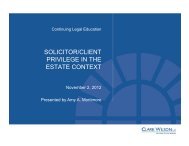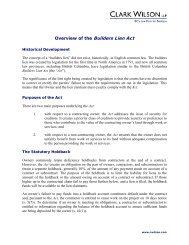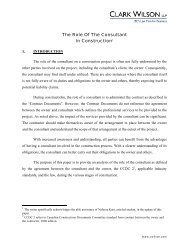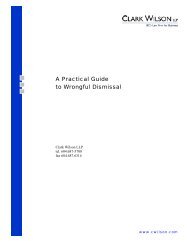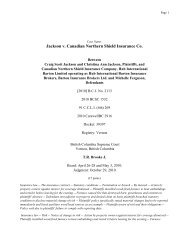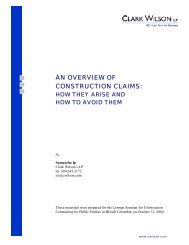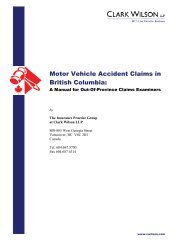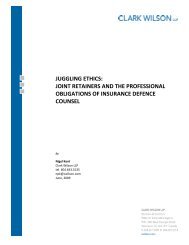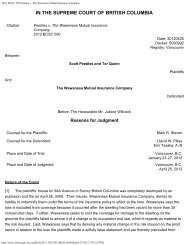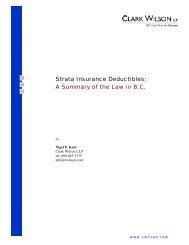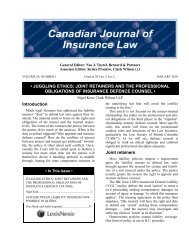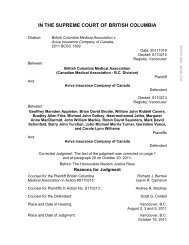Create successful ePaper yourself
Turn your PDF publications into a flip-book with our unique Google optimized e-Paper software.
Kruger Products Limited v. First Choice Logistics Inc. Page 28<br />
tenant to keep the Landlord indemnified with respect to any damage to the<br />
premises occasioned by the negligence of the tenant ... whereas there is no<br />
such provision in the leases in the T. Eaton case.<br />
I do not accept this submission. In my view para. 8(2) does not impose upon<br />
the tenant any greater liability for fire caused by its negligence than exists in<br />
the absence of such a provision ...<br />
...<br />
This [omitted quotation from T. Eaton at 428] clearly indicates that even in the<br />
absence of a specific provision requiring the tenant to indemnify for damage<br />
caused by its negligence, there is no doubt as to the liability of the tenant for<br />
a fire caused by its negligence. I therefore cannot see how the presence of a<br />
provision such as para. 8(2) changes the effect of the landlord’s obligation to<br />
insure. I note that para. 8(2) does not ... purport to override the operation of<br />
the para. 8(1) [i.e., the covenant to insure]. In my view the practical effect of<br />
the T. Eaton case is that the presence in a lease of a covenant on the part of<br />
the landlord to insure for fire, unless a clear intention to the contrary is<br />
expressed, will result in the tenant being protected from liability for negligently<br />
caused fires. I do not regard para. 8(2) as expressing such a contrary<br />
intention. [At paras. 11-3; emphasis added.]<br />
2013 BCCA 3 (CanLII)<br />
[57] Nor can I agree on a more general level that the application of the “covenant<br />
to insure” defence in the case at bar would “make meaningless” the warehouser’s<br />
obligation to maintain the warehouse premises to the standard specified in the<br />
Warehouse Receipt Act, or “impair” the duty of care owed to Scott as the owner of<br />
the goods. A similar argument was raised and rejected in Evans Products v. Crest<br />
Warehousing [1980] 1 S.C.R. 83. It did not involve insurance but concerned the<br />
validity of a clause in a bail agreement that limited the warehouser’s liability for loss<br />
or damage of the stored goods to $50 per package unless a higher value was<br />
declared by the owner. The warehouser’s negligence caused a fire that damaged<br />
the goods and the warehouser sought to rely on the limitation on its liability as a<br />
defence to the owner’s claim for damages. The owner argued that giving effect to<br />
this limitation of liability would “engender carelessness” on the warehouser’s part,<br />
thus contravening what was then s. 3(4)(b) of the Warehouse Receipt Act. (See<br />
now s. 2(4)(b).) Various American authorities were referred to in this regard, but the<br />
majority, per Mr. Justice MacIntyre, did not find them persuasive. In his words:<br />
It is clear, in my opinion, that a contractual limitation of liability does not<br />
impair the obligations to take care declared in s. 14 of the Act. That<br />
obligation is statutory and not subject to modification by private contract.<br />
Even if a limitation of liability did have the effect of inducing carelessness on



